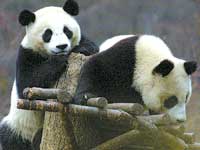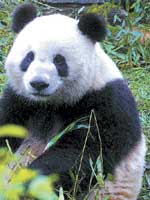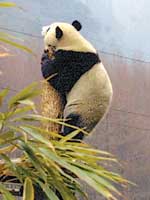|
Pandas take giant step
By Li Jing (Beijing Weekend)
Updated: 2004-02-26 15:20
 The pulling power of Southwest China's Sichuan Province has just been increased, courtesy of its most famous residents - giant pandas. The pulling power of Southwest China's Sichuan Province has just been increased, courtesy of its most famous residents - giant pandas.
Locals often joke with visitors to the province that they can claim two famous residents: Deng Xiaoping, the late Chinese leader whose hometown is located in Guang'an, and the panda, an enduring symbol of China.
Pandas ?though considered to be an endangered species - continues to flourish in Sichuan thanks in large part to technological breakthroughs in techniques.
With the panda population at Sichuan's long-established Wolong Reserve increasing in recent years, it has become an urgent issue to separate them into groups under a new protection scheme.
 The result is Bifengxia Panda Breeding Base, the largest of its kind in China. It was completed last month and recently opened to visitors. The result is Bifengxia Panda Breeding Base, the largest of its kind in China. It was completed last month and recently opened to visitors.
More than 16 pandas were moved to the Bifengxia base in December 2003. It was the biggest artificial migration of captive-bred giant pandas ever seen.
Located 150 kilometres west of downtown Chengdu, the provincial capital of Sichuan, Bifengxia Panda Base is arguably the best place to see pandas in the natural scenery they inhabit.
Extending to about 60 square kilometres, Bifengxia has been long famous for its forest coverage, waterfalls, river and breathtaking landscapes.
Now that it has been selected as China's latest giant panda protection base, Bifengxia has a new role to play in altering the destiny of the endangered species. Pandas will be returned to nature after they have been given relevant training in simulated wild environments.
At up to 1,200 metres above sea level, Bifengxia is under the jurisdiction of Ya'an City.
 In the dense broadleaf forest with singing birds and murmuring streams stands a big gate with the image of a lovely giant panda carved on it, marking the entrance to Bifengxia Giant Panda Base. In the dense broadleaf forest with singing birds and murmuring streams stands a big gate with the image of a lovely giant panda carved on it, marking the entrance to Bifengxia Giant Panda Base.
Walking through the gate and along the meandering mountain slope for a while, visitors can see several European-style cabins made of bricks and tiles. These are the pandas?homes. Camphor trees and oaks add mystery to the unusual environment.
More than 20 spots have been set aside for panda-related activities and scientific experiments. There are dedicated grazing grounds, "kindergartens?for young pandas and even a panda hospital and research institute.
Several different varieties of bamboo, all favourites of the giant panda, have been planted in the base either by the water or on the slopes. The new home for giant pandas appears like a park with a natural environment.
The 16 giant pandas in the base will be raised through an outdoor method so as to encourage them to develop abilities better fitted to the natural environment. The base will lead the world in raising pandas in this way.
Upon completion of the whole project, the base will have four functional areas for grazing, offices and living quarters.
This new base is a branch of the China Giant Panda Research and Conservation Centre in Wolong. With vegetation coverage of 80 per cent, it is the world's largest giant panda eco-park.
It is planned that in five to seven years, the base will have 40 giant pandas in total.
Another good place to see pandas is the Chengdu Panda Breeding and Research Centre.
The centre is located on the mountain of Futoushan, 16 kilometres north of downtown Chengdu.
It is recommended to visit the Chengdu centre in the morning, between 8.30 and 10am, during feeding time. Outside these hours it's likely the pandas will be indulging in their favourite pastime - sleeping!
|
Travel info
How to get to Chengdu:There are many flights from Beijing to Chengdu every day. It takes 1.5 hours and tickets can be bought for as little as 800 yuan (US$96) one-way after discounts. Trains leave Beijing from Beijing West Railway Station and cost around 400 yuan (US$48) for a sleeping berth. It takes 24 hours.
After getting to Chengdu, many bus routes go to the Chengdu Panda Breeding and Research Centre and the Bifengxia base.
Entrance:30 yuan (US$4) for each.
|
|
